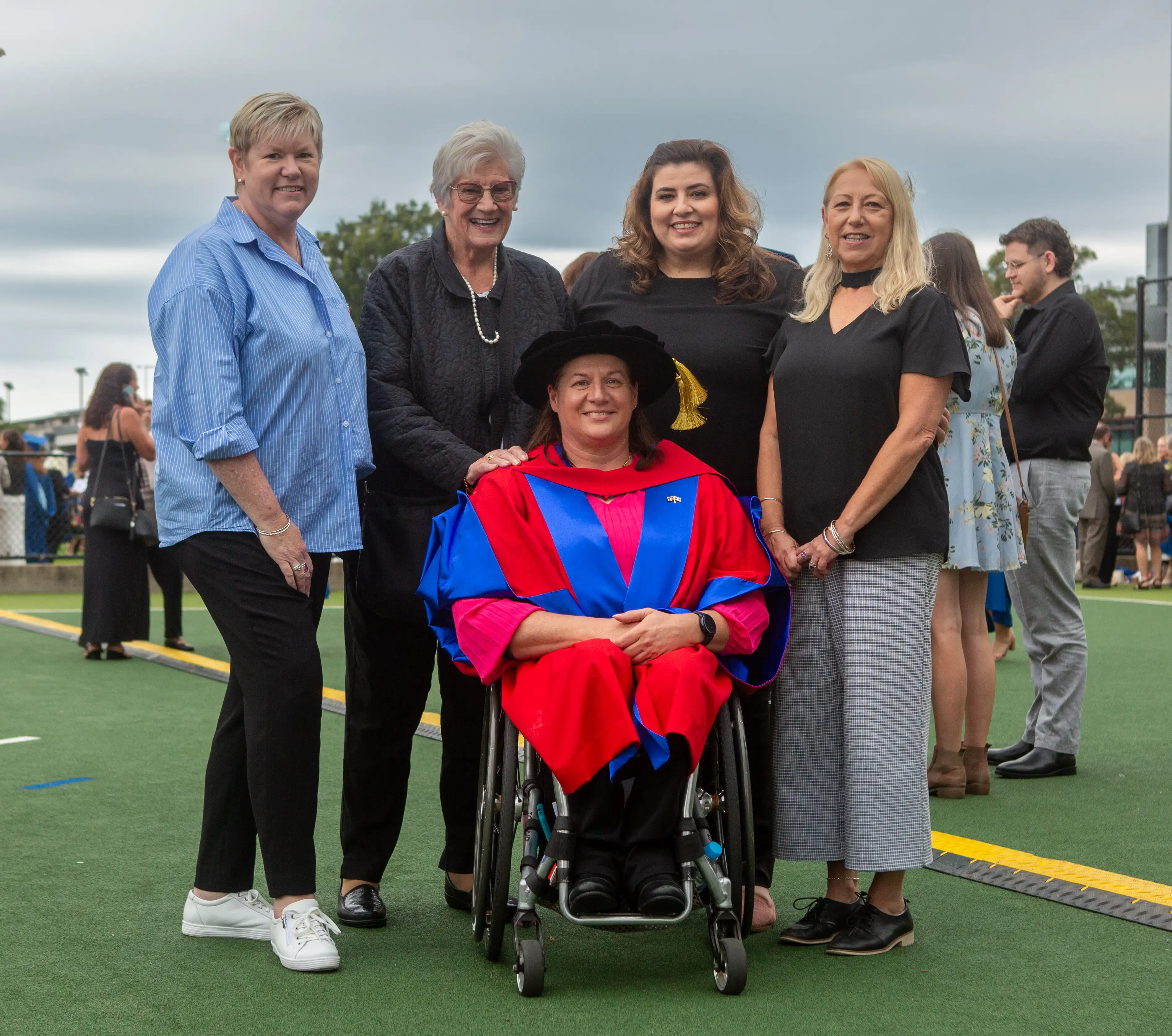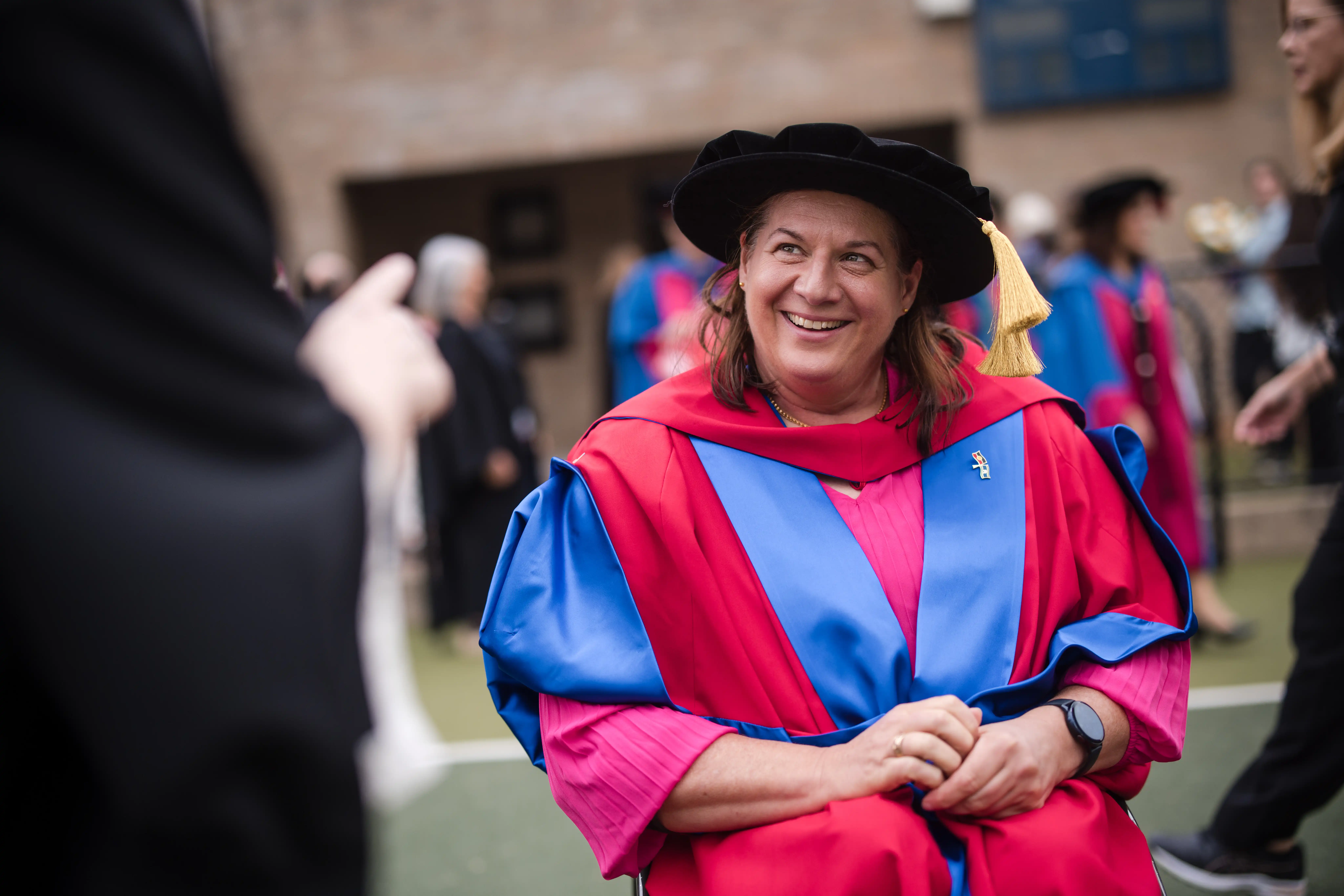Wheelchair racing legend Louise Sauvage receives Honorary Doctorate
Australia’s most revered Para-athlete recognised for outstanding contributions to sport and disability advocacy
Louise Sauvage has always been driven by a philosophy of “see an opportunity and take it”.
As one of Australia's most renowned Paralympic athletes, Ms Sauvage has left a lasting mark on the world of wheelchair racing as both an athlete and a coach.
With nine gold and four silver medals from four Paralympic Games, two gold and one bronze medal from three appearances in demonstration races at the Olympic Games, 12 gold and two silver medals from four IPC Athletics World Championships and numerous other victories in the world’s most prestigious road races, few have, or ever will, match Ms Sauvage’s achievements in sport.
This week (Wednesday 17 April), Louise Sauvage OAM was recognised for her outstanding achievements and contributions to the world of sports and disability advocacy, with a Doctors of Letters (honoris causa) from the University of Wollongong (UOW).
In talking to Ms Sauvage, you get the distinct feeling that as much as she was always driven to excel in her chosen sport from as early as her first international race, above all she was driven to elevate the sport and change the very definition of what it means to be an athlete with a disability.
She raised the profile and perception of Paralympic sport and Paralympic athletes in Australia and around the world, ensuring people celebrated athletes for their outstanding ability, not their limitations.
Before she was a four-time Paralympian, growing up as a kid in Perth in Western Australia, Ms Sauvage was surrounded by people that loved sport.
Her parents encouraged her and her sister to participate in sport from a very young age.
“We're a sports-crazed country and my parents, having active children, wanted to encourage them to participate in sport,” Ms Sauvage said.
As a nine-year-old Ms Sauvage was introduced to a new world, one that would go on to shape the direction of her life forever.
“I did a bit of sport through school, but it wasn't until I found wheelchair sports that I got involved, up until then I didn't know there was a completely different world out there for me.
“I could compete equally and be as competitive as all the other kids with similar disabilities. Suddenly the world opened up. I was very good at it and I loved it.”
Ms Sauvage was born with a severe congenital spinal condition which inhibits the function of the lower half of the body, giving limited control over the legs. She underwent 20 operations before turning 10.
Undaunted, Ms Sauvage was able to channel her determination and competitiveness and thrive in wheelchair racing.
“Part of my personality is probably being very stubborn and driven. Things that make you a great athlete, being determined, seeing how far you can physically and mentally go with sport.
“Understanding that is what you need to do, you need to be a little bit selfish sometimes to get what you want, to achieve what you want.”
Career as a professional athlete
Competing in her first international competition, the 1990 World Para Athletics Championships in Holland, at just 16, she won gold in the 100m, setting a new world record at the same time.
She made her Paralympic Games debut in Barcelona 1992, at the age of 17, winning three gold medals in the 100m, 200m and 400m and silver in the 800m.
Ms Sauvage went on to dominate the sport of wheelchair racing, elevating its profile to an international level. She set new world records for the 1500m and 5000m events at the 1996 Atlanta Paralympic Games, winning four gold medals.

Her success at Atlanta skyrocketed her career and pushed the sport to unimaginable heights. Ms Sauvage was one of the first Paralympians in Australia to gain corporate sponsorship, changing the course of the future opportunities of the sport to reach new audiences.
“Leading into Sydney 2000 was the first time I got corporate backing. It was not until I started to get some corporate sponsorship that I realised I could have a stable financial future in my sport.
“To be an athlete with a disability and be professional was unheard of. For someone to try and achieve that was awesome. Now for those that came after me it is common.”
Her home Paralympic Games in Sydney in 2000 were special in many ways. She had the honour of lighting the cauldron at the Opening Ceremony.
Ms Sauvage won gold in both the 1500m and 5000m and silver in the 800m. She also won gold for her appearance in the 800m demonstration race at the Sydney 2000 Olympic Games in front of a crowd of more than 110,000 people.
Reflecting on the highlights of her career as a professional athlete, she said the elevation of the sport during that time was something she is most proud of.
“It is any athlete’s dream to have a home Games.
“Personally, having family, friends and people that didn't really know what I did, come to Sydney, and have them suddenly understand why I trained so much and what it was all about. It was just phenomenal to have that realisation of what it took to get there and what I did.
"It was a big turning point for the Paralympics overall. The way we were represented, the way the Paralympics were put on, the way the media got behind it, the education within schools and a whole bunch of different things made it a huge success.
“It made me proud to be Australian. To know that my country had done that, and it set a precedent for the next Paralympics after that, and the ones to come after that again.
When the Paralympics come back to Australia in Brisbane in 2032, she hopes Australia can continue to be a pioneer.
“Not only highlighting the sport, but highlighting our country, and it's accessibility and inclusiveness.”
After 14 years dominating the sport, she retired after the 2004 Athens Paralympic Games.
Retirement, a new chapter
After retiring from competition Ms Sauvage commenced her journey as a coach, mentoring young wheelchair athletes and establishing the ‘Aspire to be a Champion Foundation’ to support athletes with disabilities.
As a well-respected Wheelchair Track and Road coach at the NSW Institute of Sport, her athletes have achieved Paralympic gold, world records, World Championship gold and Commonwealth Games gold medals.
As a lifelong learner, she continues to be a big believer in learning along the way rather than waiting for someone else to lead.
“Coaching athletes at the top level you really need to think outside the square. You need to keep pushing those limits. You need to keep innovating and working. You can never stop because everything changes all the time.”
Ms Sauvage has been to a further four Paralympics as a national coach and will find out in June if she will be selected for the Paris 2024 Paralympics. If she does, it will make it her ninth Paralympics appearance as an athlete and then coach.
Disability advocacy
As Patron of Wheelchair Sports NSW/ACT for more than 20 years and Ambassador of the Rainbow Club, Ms Sauvage is committed to supporting grassroots organisations and knows firsthand that these provide the catalyst for such great things for members of the community with disabilities.
“It's fantastic to see our athletes having the same opportunities as their able body counterparts. That's probably helped change the perception of a lot of sports.”

She is excited to see the current and next generation of Para-athletes continue to advocate for the sport.
“I want the world for the athletes that are now competing. I want them to be recognised. I want them to be seen, I want them to get the sponsorship. I want them to be on billboards. I really want them to have the same kind of opportunities.”
“A lot of people say ‘if you can't see it, you can't be it’ - but the kids can see it now. They can see their heroes, their hero athletes on TV. They see them in ads. They see them in real life. That is brilliant. I never had any of that as a kid.”
Ms Sauvage’s extraordinary achievements and contributions have been rightly recognised with many prestigious awards, including the first athlete with a disability to be inducted into the Sport Australia Hall of Fame and then elevated to Legend status. She has been awarded the Order of Australia Medal, was the inaugural athlete inducted into the Australian Paralympic Committee Hall of Fame, inducted into the International Paralympic Committee Hall of Fame and the recipient of the Laureus World Sportsperson of the Year with a Disability award, to name just a few.
She has a Sydney ferry, street and pathway named after her, as well as numerous school sport houses around Australia.
Honoured to be recognised by UOW
Ms Sauvage said she was extremely honoured to receive her Honorary Doctorate, made extra special with her mum flying in from Perth to celebrate the occasion with her.
“It has been amazing to be recognized on so many different levels throughout my career and this is just another one of those that I am blown away with. It is quite phenomenal.”